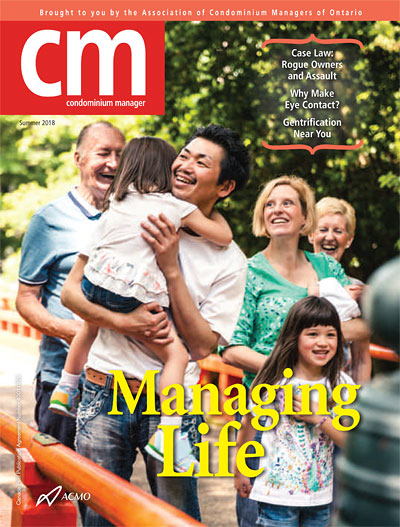
From the Summer 2018 Issue
Pro Tips for Achieving
Compliance with New Law
It’s been said more than once that the job of a condominium director is a thankless one. Often, the same can be said for condominium property managers, despite getting paid; and the tasks and duties of managers keep piling up (or what might feel more like piling on).
Probably the greatest burden for most condominium managers (and, really, just about everybody connected in any way with condominiums in Ontario during the past few years) has been keeping up and coping with changes to legislation. In addition to navigating, amongst other things, the requirements of the new Condominium Management Services Act, 2015, AODA regulations, the pending legalization of marijuana, changes to the Employment Standards Act, and the new standard form of residential tenancy agreement, managers have also been required to understand and adjust to several significant modifications to the Condominium Act, 1998, its regulations and forms, with many more yet to come.
According to a conversation I had with Ministry staff about a week before being asked to write this article, it appears that the coming into force of the still pending statutory amendments and new regulations under the Condominium Act, 1998, will continue roll out in a slow and steady pace over at least the next year, and possibly longer. So, looking both to the immediate past and the impending future, it seems that dealing with legislative change has become not only a critical issue but a constant concern for condominium property managers as well as other condominium stakeholders and service providers in Ontario.
In view of that, what’s a manager, or a management company, to do? Here are some brief tips (under two key headings) that might help:
1. Be aware and informed.
Nothing can be worse, when it comes to dealing with changes in the law, than being surprised by them. Lack of up-todate awareness can hurt you in two ways: On the one hand, you can learn about some new regulation or provision coming into force when you are least prepared for it; on the other, you might find that some provisions you think are in force, aren’t yet. In order to make sure you are doing the right things at the right times, you need to have current, accurate knowledge of the status of the law.
One tip is to occasionally view the statute you are concerned about on the government’s e-laws website (https:// www.ontario.ca/laws). There you can confirm, almost at a glance, and with a significant degree of confidence, which provisions of the law are already in force, and which ones are not. This is because the government helpfully shades pending parts of legislation in grey, and those not shaded are currently in force. A tab at the top of the screen for each statute also lets you access all of its current and pending regulations, where the same shading practice applies.
You can also be informed by using other online resources, such as specialized, topical websites (like www.aoda.com and www.aodaalliance.org, for information relating to the very gradual implementation of the Accessibility for Ontarians with Disabilities Act, 2005), legal blogs and online news alert services that let you know whenever key words or topics are mentioned in articles or other posts.
For condominium law changes in particular, linking to legal blogs is probably your best bet. Among the most active are Denise Lash’s Condo Law, Chris Jaglowitz’s Ontario Condo Law Blog, and Rodrigue Escayola’s Condo Adviser, and there are many others you can comb for information about legislative changes as and even before they happen.
In addition, a number of condominium lawyers and other professionals are active on social media. Following key players can help you to gain some interesting insights. A group on Twitter that Rod Escayola has affectionately named the #CondoGeeks sometimes examine new provisions and forms under the Condominium Act, 1998, at length (occasionally with a fair dose of disagreement and humour).
You can also get excellent information by keeping up with what organizations such as ACMO and your local chapter of CCI provide. Their courses and publications are worth regularly reviewing.
2. Be connected and collaborative.
Once you do know what changes in the law are in force and apply to you or your clients, it’s best not to rely solely on yourself to ensure that you are doing the right things.
Every condominium property manager likely has a network of industry professionals that he or she can speak with about those changes and how to implement them. In addition to possibly having advanced understanding of the effects of the changes, they might have already turned their minds to ways in which the new requirements can be efficiently and effectively satisfied. Seeking their suggestions will always work better than simply going it alone. (Hint: This is one of the benefits that groups like ACMO and CCI facilitate.)
Not going it alone can also include working collaboratively with other property managers, even your competitors. If you aren’t in one of the larger management companies, you might consider getting together occasionally with other smaller companies and solo service providers to discuss what’s changing and share some of your best practices and experiences. It might seem counter-intuitive, but often the best competitor is an equal one. This helps keep the bar raised high so each competitor gives his, her or its very best; and cooperative interactions also help small-scale managers keep up with the larger players, and provide the basis for a supportive community when help is needed.
If you are part of a larger management service provider, then you have an even greater opportunity to share the knowledge and compliance workloads. For example, small committees or individual staff members can each take on different tasks – following a particular blog, keeping up to date on a particular piece of legislation, or studying a particular issue and its implementation – and then share and get feedback about their findings and ideas with the others.
The bottom line is that legislative changes can’t be avoided, and the speed or volume at which they come is not under your control. Every manager has to learn about and comply with new law in ways that don’t negatively impact effective, efficient and affordable delivery of services. Knowing where to find the information you need, the sources you can rely on, and the partners you can trust are all critical components that will help you to make the right changes at the rights times in the best possible ways.
Michael Clifton is a founding partner of Clifton Kok LLP Legal Counsel, condominium law professionals. Michael has practiced Ontario condominium law since 2002, has been a court appointed condominium administrator, an expert witness on condominium management related issues, and currently serves as a member and vice-chair of the Condominium Authority Tribunal. You can find many articles, blogs and other resources on Ontario condominium law by Michael and others at his firm on Facebook, Twitter and their website. cklegal.ca



